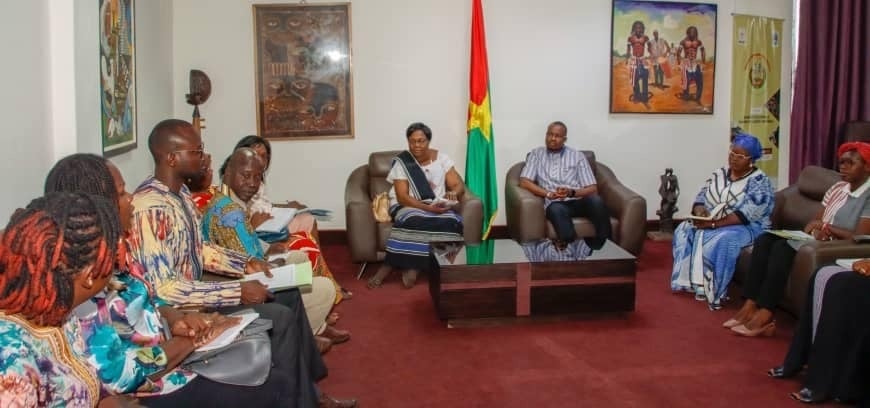
CONAMEB
How youth activists are pushing to end child marriage in Burkina Faso
In Burkina Faso, civil society and youth activists helped raise awareness on the legal gaps around child marriage. They advocated for reform to protect the rights of thousands of girls to complete their education.
Burkina Faso was one of the first countries to launch the African Union End Child Marriage Campaign, in 2014. However, despite efforts to end child marriage, nearly one in two girls is married before the age of 18. Burkina Faso is one of the countries with the highest child marriage and school dropout rates in Africa. UNICEF warns that, at the current pace, it could take more than 100 years to end child marriage in West and Central Africa—underscoring the urgency of action.
CONAMEB (La Coalition Nationale Contre le Mariage des Enfants au Burkina Faso), the country’s leading end child marriage coalition and recipient of Education Out Loud support through a grant led by Girls Not Brides, has been at the forefront of efforts to eradicate this harmful practice.
With bold vision and strategic fundraising, CONAMEB triggered a legal review to change the minimum age of marriage of girls. Following this review, the Transitional Legislative Assembly adopted the new Persons and Family Code on September 1st, 2025. The code raised the minimum age for marriage to 18 years for girls. This much anticipated and welcome news has the potential to transform the future of education and is an indication of the country’s efforts to protect the rights of thousands of girls to complete their education.
CONAMEB and the youth activists within the coalition contributed to making this change a reality through a mix of grassroots mobilization, youth leadership, and strategic partnerships. Youth activists were particularly visible in the successful development and implementation of digital campaigns as well as attending meetings with key decision makers to ensure that their voice was heard.
A legal contradiction with life-changing consequences
In 2022, CONAMEB conducted an analysis of the impact of the country’s security crisis. They found increased child marriage rates as well as reduced access to preventive and treatment services among vulnerable girls. The rise in internally displaced people in the country may further drive child marriage as a coping strategy for families in challenging situations. Child marriage and early childbearing are significant factors leading to girls discontinuing their secondary education.
While national education policies promote access to education for girls, a major legal contradiction stood in the way: the former Persons and Family Code set the minimum age of marriage at 17 years old for girls and 20 years old for boys, though girls could marry at as young as 15 and boys at 18 if authorized by the courts. For advocacy around the elimination of child marriage to be sustainable, the education and marriage laws in the country needed to be aligned.
To address this issue, CONAMEB and youth activists launched a nationwide advocacy and communications campaign to raise awareness of the legal gaps and advocate for legal reform. Their initiatives included organized community dialogues, rallies for legal alignment, and engagement with traditional and religious leaders. As these leaders are gatekeepers of social values, they are well positioned to play a critical role in shifting social norms by using their authority and influence to discourage child marriage and promote girls’ education. Their strong political influence also plays a part in bridging national policies and local realities, fostering community ownership and sustainable change in attitudes and practices.
While CONAMEB was raising awareness and building community support, they also needed institutional backing and funding to aid the Ministry of Justice in updating the Persons and Family Code. With strategic support from Girls Not Brides, CONAMEB developed a targeted fundraising strategy and secured a further US$ 18,000 (10M CFA) from development partners, enabling the ministry to formally launch the legal review process.
The approach was both tactical and inclusive: by bringing civil society, government, and international partners around the table, the effort ensured shared ownership and sustainability. Most importantly, youth voices within CONAMEB were central—they were engaged throughout the advocacy process and equally contributed to the drafting of the advocacy document that was used to engage stakeholders at all levels.
A legal pathway to education and protection
Despite the long process to adopt the new law, the interim outcomes and milestones were remarkable. For the first time, legal reform on child marriage was being driven by civil society including young people and community grassroots leaders, primarily coordinated by one coalition, in partnership with the highest levels of government.
The initiative has catalyzed national conversations, with increased media attention and momentum building among lawmakers. More importantly, it has opened new spaces for youth and community participation in governance, signaling a shift in how policy is shaped in Burkina Faso.
The strategic advocacy led by CONAMEB and youth activists was not only geared to raising the legal minimum age of marriage for girls, but to removing a major barrier to keeping both boys and girls in school, laying the foundation for more equitable, educated futures.
As Burkina Faso moves towards implementing the new law, the global community has an opportunity to stand with such changemakers. Aligning marriage and education laws is just one step, a bold one, that was and continues to be led by civil society and young people. By mobilizing youth voices and uniting civil society around a common goal, CONAMEB has helped to shift the conversation from local-level advocacy to a national legal reform agenda.
This article was originally posted on GPE’s website. Read the original article here.
